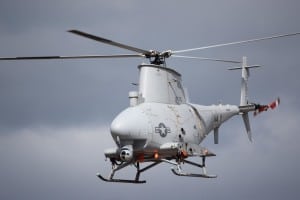The Navy announced it intends to issue a Request for Proposals (RFP) early next year for the design, development and production of the Coastal Battlefield Reconnaissance and Analysis (COBRA) Block II system.
The COBRA program is used to conduct unmanned aerial tactical reconnaissance in littoral spaces from the Northrop Grumman
[NOC] MQ-8 Fire Scout unmanned aircraft to detect and localize mines and minefields in the surf and beach zones near the water surface. It will be used for the Mine Countermeasures Mission Package for Littoral Combat Ships and potentially other vessels of opportunity.
The COBRA Block I, built by Arête Associates, is currently fielded with Helicopter Sea Combat Squadrons conducting mine countermeasures operations and provides daytime mine and obstacle detection from an MQ-9B Fire Scout. The Block II plans to increase those capabilities by enhancing surface and near surface daytime and nighttime detection and imagery of individual moored and drifting mine-like objects, minefields and minelines from the surf zone through deep water in a single pass at a high coverage rate.
The Navy intends these improving system capabilities on the Fire Scout to allow operators to stay at a safe distance from mines, obstacles and enemy fire while searching for mines.

The announcement, on Dec. 14, said the Navy expects to release the RFP in the second quarter of fiscal year 2022, which starts in January 2022. The notice said the Navy anticipates the contract will be a cost-plus fixed-fee for the development of up to three engineering and manufacturing development models and fixed price for up to five Low Rate Initial Production units for the COBRA Block II.
In the notice, the Navy underscored it received “valuable market research” from industry feedback in response to a sources sought notice posted in July 2020 (Defense Daily, July 14, 2020).
“The capability statements and technical solutions submitted by potential offerors identified broad interest from numerous responsible industry partners. Based on this research the Government has decided there is a potential for two or more small business concerns capable of competing for the requirement as a Small Business Set-Aside,” the notice added.
Therefore, the government intends to release the solicitation for limited competition and on a small business set-aside basis.
The initial COBRA system first achieved initial operational capability in 2017 (Defense Daily, Oct. 11, 2017).